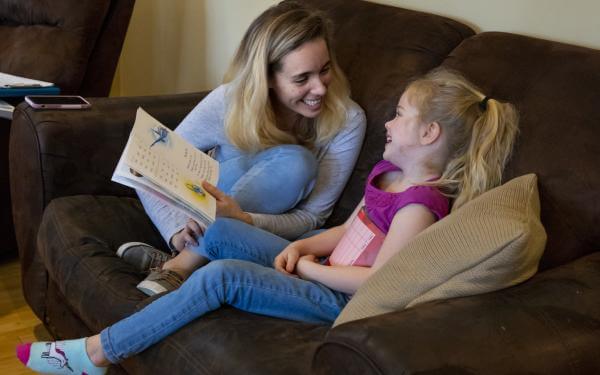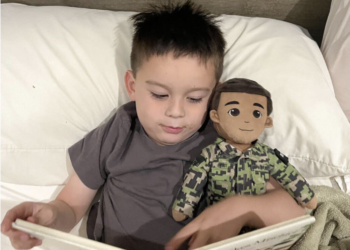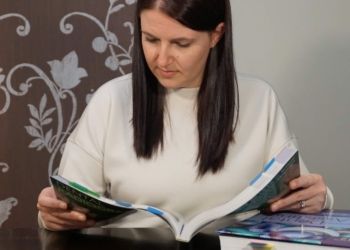During the coronavirus quarantine, parents homeschooling their kids for the first time became fodder for an endless supply of jokes about the struggles of teaching kids at home.
“If you had asked me what the hardest part of battling a global pandemic would be,” one social media post said, “I would have never guessed ‘teaching elementary school math.’”
So, it may be surprising to learn 30% of parents polled by USA Today said they are “very likely” to homeschool their elementary-age children this fall rather than have them return to bricks-and-mortar classrooms in the midst of the pandemic.
How easy is it to make the switch from being parenting your student to being your child’s teacher? Marine Corps spouse Melissa Battles, a mother of five who began homeschooling when her 17-year-old was in first grade, maintains problems are few.
“One thing I hear a lot is ‘I don’t have the patience to homeschool,’ but you do,” she said. “Everybody and anybody can homeschool. There are going to be some hard days and some wonderful days. But take it day by day. It’s such a rewarding thing to do.
“My biggest tip would be if your child is having a rough moment where they aren’t getting something or they’re struggling to focus, take a minute (or longer) and have them go play outside.” she adds. “If it’s raining, find an area in the house where they can burn a little energy. You’ll be amazed at the attitude change you will see.”
National Home School Association Executive Director J. Allen Weston suggests the first step when transitioning to homeschooling is determining your child’s learning style, which may be visual, auditory or kinesthetic. Buying books for a child that learns by listening or doing or using audiobooks for someone who learns by seeing or doing would be a waste of money, he said. Curriculum materials also are separated into secular or faith-based.
One hot-button topic for those new to homeschooling is whether to pursue “school at home” — essentially replicating a public or private school curriculum in a home classroom or online — versus more eclectic homeschooling methods taught at the child’s pace. The most unstructured form of child-and-interest-led learning is “unschooling.”
Weston believes child-led methods are the clear winners. “The most successful homeschoolers do not focus on what they are ‘supposed’ to be learning and instead focus on learning what is interesting and relevant to them,” he said.

The “busywork” phenomenon in a traditional classroom is one reason Becky Brown, a former teacher and Navy spouse, first considered homeschooling. When her husband started college out of state, Brown knew the time was right to make the switch.
“I wanted them to have time with their Dad,” said Brown, explaining homeschooling enabled her children to follow a school calendar that maximized family time.
While COVID-19 forced many families to spend last spring overseeing their children’s schoolwork from home, veteran homeschoolers are quick to point out that “quarantine schooling” has little in common with homeschooling.
“I’ve been homeschooling for 16 years and this is not normal,” Brown said last May. “We are all missing our normal activities and friends.”
Weston echoes those thoughts. “Homeschooling is a lifestyle dedicated to the joy of learning,” he says. “True homeschoolers understand that learning is an adventure to be experienced and cherished — not a chore to muddle through to get a grade.”
J. Michael Smith, president of the Home School Legal Defense Association, notes military families have the legal right to homeschool in all 50 states. That legal protection extends internationally, even in countries such as Germany where homeschooling is illegal.
Parents of high schoolers do have to keep a transcript and comply with their state’s high school curriculum, particularly important if their child will be applying to college or enlisting in the military. Standardized testing, a thorn in the side of many public-school parents, is not as burdensome when homeschooling.
“Less than half of states require standardized testing,” Smith said. “You can do standardized testing any time you want to, but you don’t have to unless the state you’re living in requires it.”
Most importantly, the decision to homeschool need not be etched in stone.
“You don’t have to commit for a lifetime,” Smith said. “You can start for six months at a time and see how it goes.”
With the coronavirus pandemic showing few signs of abating, Navy spouse Tiffany Chitwood has pulled the trigger on a third option. She’s waiting a year to enroll her five-year-old son in kindergarten.
“Washington state law allows you to wait until age eight, so I don’t see a real problem in waiting,” she said.
Where to turn for advice:
- National Home School Association https://nationalhomeschoolassociation.com/index.php– Parents considering homeschooling can download a free e-book from the Home School Institute entitled “Terra Scholar–A Complete Handbook for Today’s Homeschooler”
- Home School Legal Defense Association (HSLDA) provides information on individual state homeschool laws while also offering advice on grading, year-end assessments and record keeping. It also offering a “Home School GPS” program that helps guide parents through the process of transitioning to homeschooling as well as over 40 online courses and an SAT Prep course.
- Facebook: “Military Homeschoolers,” “Military Homeschool Family Network,” “Military Families Homeschool” and military-community-based homeschool Facebook Pages are sources of information on curriculum options, state requirements and local resources.
- Homeschool World Forum: This forum includes a thread dedicated to military and overseas homeschoolers.
- Military School Liaison Officers: Liaison officers are available to help with kindergarten through high school education issues and can connect families with local homeschool groups.
- Non-Department of Defense Schools Program: This Department of Defense Education Activity program provides support and funding for families stationed overseas who want to homeschool.
Have you switched from traditional schooling to homeschooling? If so, what resources have you found helpful?
Read comments






































